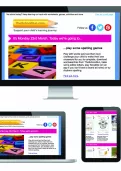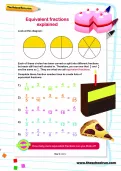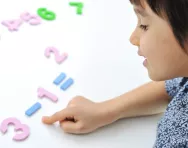Important update from TheSchoolRun
For the past 13 years, TheSchoolRun has been run by a small team of mums working from home, dedicated to providing quality educational resources to primary school parents. Unfortunately, rising supplier costs and falling revenue have made it impossible for us to continue operating, and we’ve had to make the difficult decision to close. The good news: We’ve arranged for another educational provider to take over many of our resources. These will be hosted on a new portal, where the content will be updated and expanded to support your child’s learning.
What this means for subscribers:
- Your subscription is still active, and for now, you can keep using the website as normal — just log in with your usual details to access all our articles and resources*.
- In a few months, all resources will move to the new portal. You’ll continue to have access there until your subscription ends. We’ll send you full details nearer the time.
- As a thank you for your support, we’ll also be sending you 16 primary school eBooks (worth £108.84) to download and keep.
A few changes to be aware of:
- The Learning Journey weekly email has ended, but your child’s plan will still be updated on your dashboard each Monday. Just log in to see the recommended worksheets.
- The 11+ weekly emails have now ended. We sent you all the remaining emails in the series at the end of March — please check your inbox (and spam folder) if you haven’t seen them. You can also follow the full programme here: 11+ Learning Journey.
If you have any questions, please contact us at [email protected]. Thank you for being part of our journey it’s been a privilege to support your family’s learning.
*If you need to reset your password, it will still work as usual. Please check your spam folder if the reset email doesn’t appear in your inbox.
The Curriculum for Wales 2022: what parents need to know

Children who attend school in Wales follow a different curriculum from the National Curriculum used in England – and that curriculum is currently undergoing a significant shake-up.
The Curriculum for Wales is due to be rolled out from September 2022, with primary schools being the first to switch to the new curriculum.


Start a unique learning programme!
- Weekly programme for each school year
- Worksheets sent direct to your inbox
- Keeps your child's learning on track
The curriculum is being reformed in order to raise standards, reduce the attainment gap between students, and equip young people to lead ‘fulfilling personal, civic and professional lives’ in modern society.
It aims to prepare children to thrive in a future where digital skills, adaptability and creativity are crucial, and that is rooted in Welsh values and culture.
Curriculum for Wales: the basics
The new Curriculum for Wales will be followed by children from the ages of three to 16. There won’t be separate curriculums for primary and secondary schools; rather, it will be a continuum across all stages.
The curriculum will be statutory for all maintained schools in Wales. Non-maintained schools won’t have to follow the curriculum, but will have to provide a ‘broad and balanced’ teaching programme that incorporates the six areas of learning set out in the new curriculum.
The Curriculum for Wales will have two hierarchies:
- The national-level curriculum will be defined by the Welsh government.
- The school-level curriculum will follow the national-level curriculum, but will be developed and planned by teachers in individual schools and in clusters.
It won’t be biased towards either knowledge or skills, but will allow schools to provide a balance of knowledge, skills and experiences.
The four purposes of the Curriculum
The new Curriculum for Wales has been developed to fulfil four key purposes. It aims to produce children who are, or will become:
- Ambitious, capable learners
- Healthy, confident individuals
- Enterprising, creative contributors
- Ethical, informed citizens
Areas of learning
The Curriculum for Wales will have six areas of learning.
1. Expressive arts incorporating art, dance, drama, film and digital media, and music. It will encourage creativity and critical thinking, and include performance.
2. Humanities incorporating geography, history, RE, business studies and social studies. It will be based on human experiences and will also cover Welsh culture.
3. Health and wellbeing: this covers the physical, psychological, emotional and social aspects of life, helping students make informed decisions about their health and wellbeing and learn how to manage social influences. It will include PE.
4. Science and technology incorporating biology, chemistry, physics, computer science, and design and technology.
5. Mathematics and numeracy: in the early years, this will involve learning through play. In later stages, it will include working both independently and collaboratively with others.
6. Languages, literacy and communication: this will include Welsh and English, literature and international languages. Welsh language teaching will still be compulsory (as an additional language for children who don’t use Welsh as their first language.
In addition, literacy, numeracy and digital skills will be embedded throughout all curriculum areas.
Non-curriculum areas
Relationships and Sexuality Education: RSE will be mandatory in all maintained schools, including primary schools. Parents will no longer be allowed to withdraw their children from these lessons.
The focus will be on building relationships based on mutual trust, and developing mental and emotional wellbeing, resilience and empathy.
The Welsh government will issue guidance to schools on how to provide RSE that is age-appropriate and relevant to pupils’ developmental stage, but it will give schools the flexibility to design their own programme of teaching that reflects diversity and difference in relationships, sex, gender and sexuality.
Religious education: RE will continue to be compulsory, as it is at the moment, with an agreed syllabus.
Faith schools will be allowed to teach a syllabus that reflects their religious denomination.
The RE guidance will be updated to include philosophy and religious views, plus non-religious worldviews that have similarities with religious views, such as Humanism.
Achievement and assessment
Currently, there are no SATs (statutory assessment tests) for primary school pupils in Wales.
Statutory teacher assessments are usually administered at the end of Key Stage 2 and Key Stage 3, as in England, but students do not take Key Stage 2 National Curriculum Tests (Standard Attainment Tests, or SATs).
However, Key Stage 2 assessments will not continue from September 2022 and Key Stage 3 assessments are to end when the new curriculum rollout has been completed (by 2024).
Currently, it’s proposed that headteachers will set their own ‘achievement outcomes,’ which will build an accurate picture of pupils’ skills, knowledge and competencies.
It’s suggested that this will be in the form of:
- ‘I can’ statements (e.g. ‘I can do my times tables up to 12 x 12’)
- ‘I have’ statements (e.g. ‘I have learned about the water cycle’)
National Reading and Numeracy Tests, which are taken in the summer term by pupils in Years 2 to 9, will continue under the new curriculum.
What happens next?
The consultation period for the new Curriculum for Wales has now closed (July 2019).
The feedback has been considered by the education professionals who were involved in its development, the guidance has been refined, and it is now ready for the curriculum roll-out in September 2022.








